Consumer Voice: Central to Mental Health Contexts and Practices
VerifiedAdded on 2020/07/22
|6
|1481
|100
Essay
AI Summary
This essay explores the critical importance of the consumer's voice in contemporary mental health contexts and practices. It emphasizes the principles of recovery-oriented mental health, highlighting how individualized care, patient autonomy, dignity, respect, and effective communication are central to successful treatment outcomes. The essay discusses how practitioners must consider each individual's unique experiences, perspectives, and preferences to deliver effective care, improve quality of life, and facilitate recovery from mental illness. It references various studies and principles to demonstrate the impact of consumer involvement in treatment decisions, emphasizing that active participation from patients leads to better outcomes and overall well-being. The essay concludes by reiterating the centrality of consumer voice in modern mental health approaches.
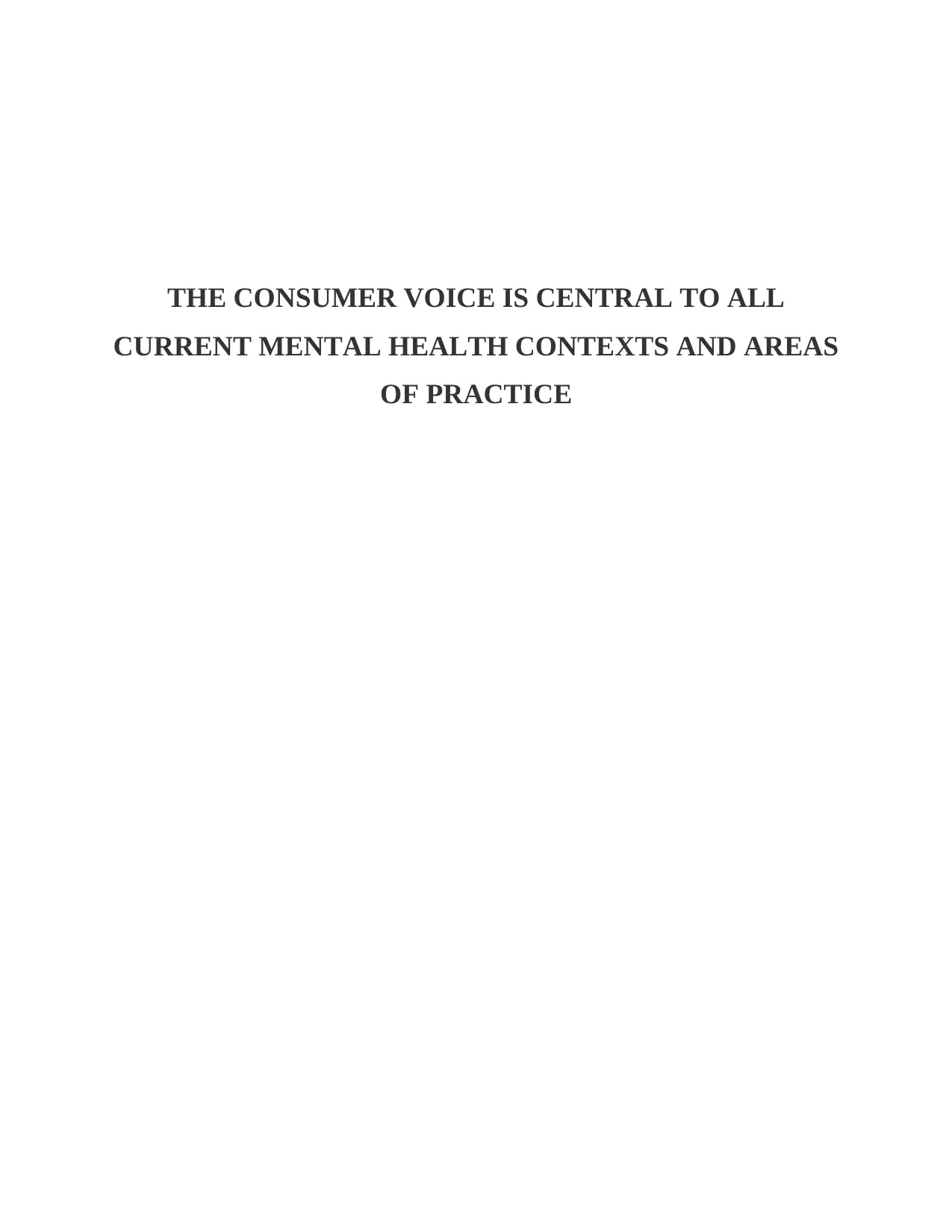
THE CONSUMER VOICE IS CENTRAL TO ALL
CURRENT MENTAL HEALTH CONTEXTS AND AREAS
OF PRACTICE
CURRENT MENTAL HEALTH CONTEXTS AND AREAS
OF PRACTICE
Paraphrase This Document
Need a fresh take? Get an instant paraphrase of this document with our AI Paraphraser

Table of Contents
INTRODUCTION...........................................................................................................................1
MAIN BODY...................................................................................................................................1
CONCLUSION................................................................................................................................3
REFERENCES................................................................................................................................4
INTRODUCTION...........................................................................................................................1
MAIN BODY...................................................................................................................................1
CONCLUSION................................................................................................................................3
REFERENCES................................................................................................................................4
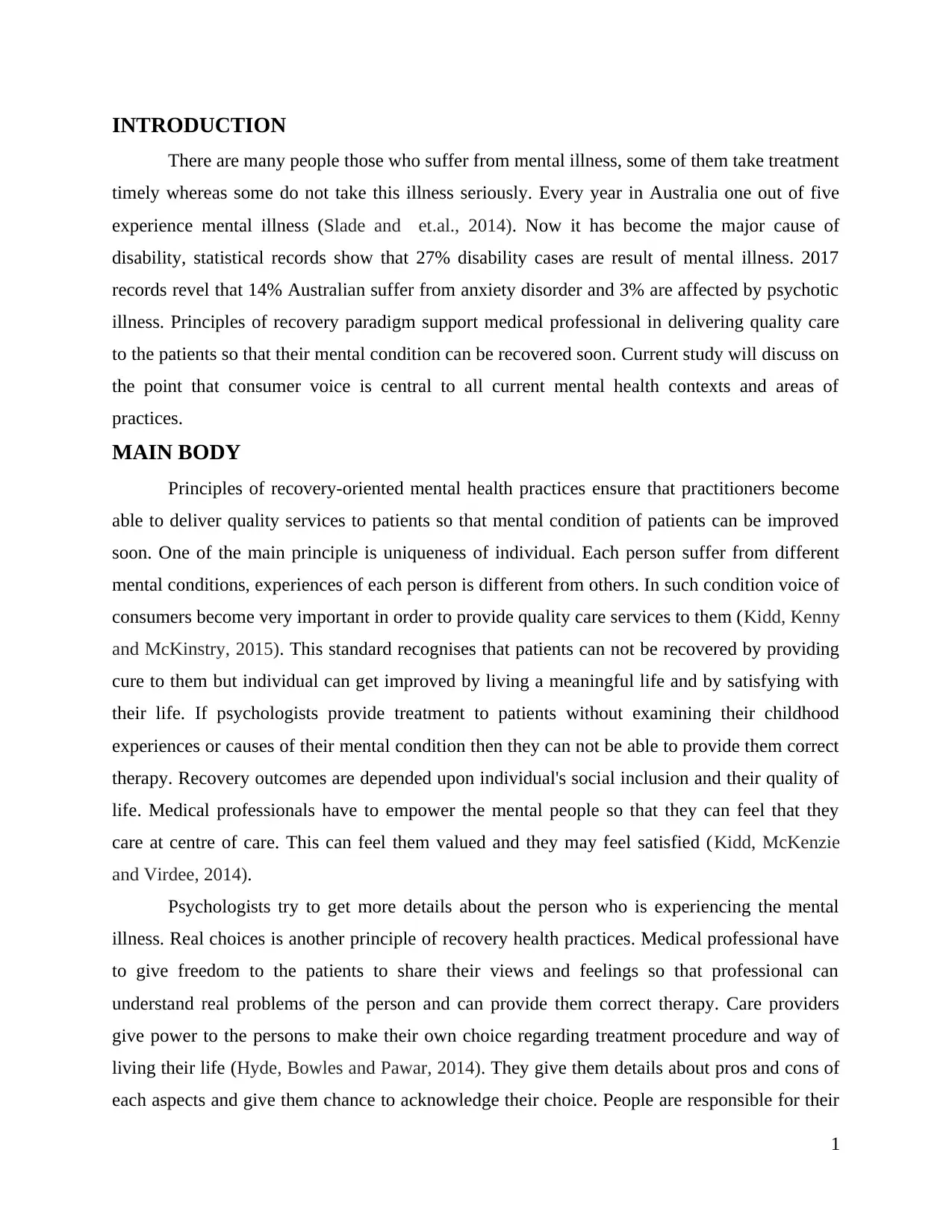
INTRODUCTION
There are many people those who suffer from mental illness, some of them take treatment
timely whereas some do not take this illness seriously. Every year in Australia one out of five
experience mental illness (Slade and et.al., 2014). Now it has become the major cause of
disability, statistical records show that 27% disability cases are result of mental illness. 2017
records revel that 14% Australian suffer from anxiety disorder and 3% are affected by psychotic
illness. Principles of recovery paradigm support medical professional in delivering quality care
to the patients so that their mental condition can be recovered soon. Current study will discuss on
the point that consumer voice is central to all current mental health contexts and areas of
practices.
MAIN BODY
Principles of recovery-oriented mental health practices ensure that practitioners become
able to deliver quality services to patients so that mental condition of patients can be improved
soon. One of the main principle is uniqueness of individual. Each person suffer from different
mental conditions, experiences of each person is different from others. In such condition voice of
consumers become very important in order to provide quality care services to them (Kidd, Kenny
and McKinstry, 2015). This standard recognises that patients can not be recovered by providing
cure to them but individual can get improved by living a meaningful life and by satisfying with
their life. If psychologists provide treatment to patients without examining their childhood
experiences or causes of their mental condition then they can not be able to provide them correct
therapy. Recovery outcomes are depended upon individual's social inclusion and their quality of
life. Medical professionals have to empower the mental people so that they can feel that they
care at centre of care. This can feel them valued and they may feel satisfied (Kidd, McKenzie
and Virdee, 2014).
Psychologists try to get more details about the person who is experiencing the mental
illness. Real choices is another principle of recovery health practices. Medical professional have
to give freedom to the patients to share their views and feelings so that professional can
understand real problems of the person and can provide them correct therapy. Care providers
give power to the persons to make their own choice regarding treatment procedure and way of
living their life (Hyde, Bowles and Pawar, 2014). They give them details about pros and cons of
each aspects and give them chance to acknowledge their choice. People are responsible for their
1
There are many people those who suffer from mental illness, some of them take treatment
timely whereas some do not take this illness seriously. Every year in Australia one out of five
experience mental illness (Slade and et.al., 2014). Now it has become the major cause of
disability, statistical records show that 27% disability cases are result of mental illness. 2017
records revel that 14% Australian suffer from anxiety disorder and 3% are affected by psychotic
illness. Principles of recovery paradigm support medical professional in delivering quality care
to the patients so that their mental condition can be recovered soon. Current study will discuss on
the point that consumer voice is central to all current mental health contexts and areas of
practices.
MAIN BODY
Principles of recovery-oriented mental health practices ensure that practitioners become
able to deliver quality services to patients so that mental condition of patients can be improved
soon. One of the main principle is uniqueness of individual. Each person suffer from different
mental conditions, experiences of each person is different from others. In such condition voice of
consumers become very important in order to provide quality care services to them (Kidd, Kenny
and McKinstry, 2015). This standard recognises that patients can not be recovered by providing
cure to them but individual can get improved by living a meaningful life and by satisfying with
their life. If psychologists provide treatment to patients without examining their childhood
experiences or causes of their mental condition then they can not be able to provide them correct
therapy. Recovery outcomes are depended upon individual's social inclusion and their quality of
life. Medical professionals have to empower the mental people so that they can feel that they
care at centre of care. This can feel them valued and they may feel satisfied (Kidd, McKenzie
and Virdee, 2014).
Psychologists try to get more details about the person who is experiencing the mental
illness. Real choices is another principle of recovery health practices. Medical professional have
to give freedom to the patients to share their views and feelings so that professional can
understand real problems of the person and can provide them correct therapy. Care providers
give power to the persons to make their own choice regarding treatment procedure and way of
living their life (Hyde, Bowles and Pawar, 2014). They give them details about pros and cons of
each aspects and give them chance to acknowledge their choice. People are responsible for their
1
⊘ This is a preview!⊘
Do you want full access?
Subscribe today to unlock all pages.

Trusted by 1+ million students worldwide
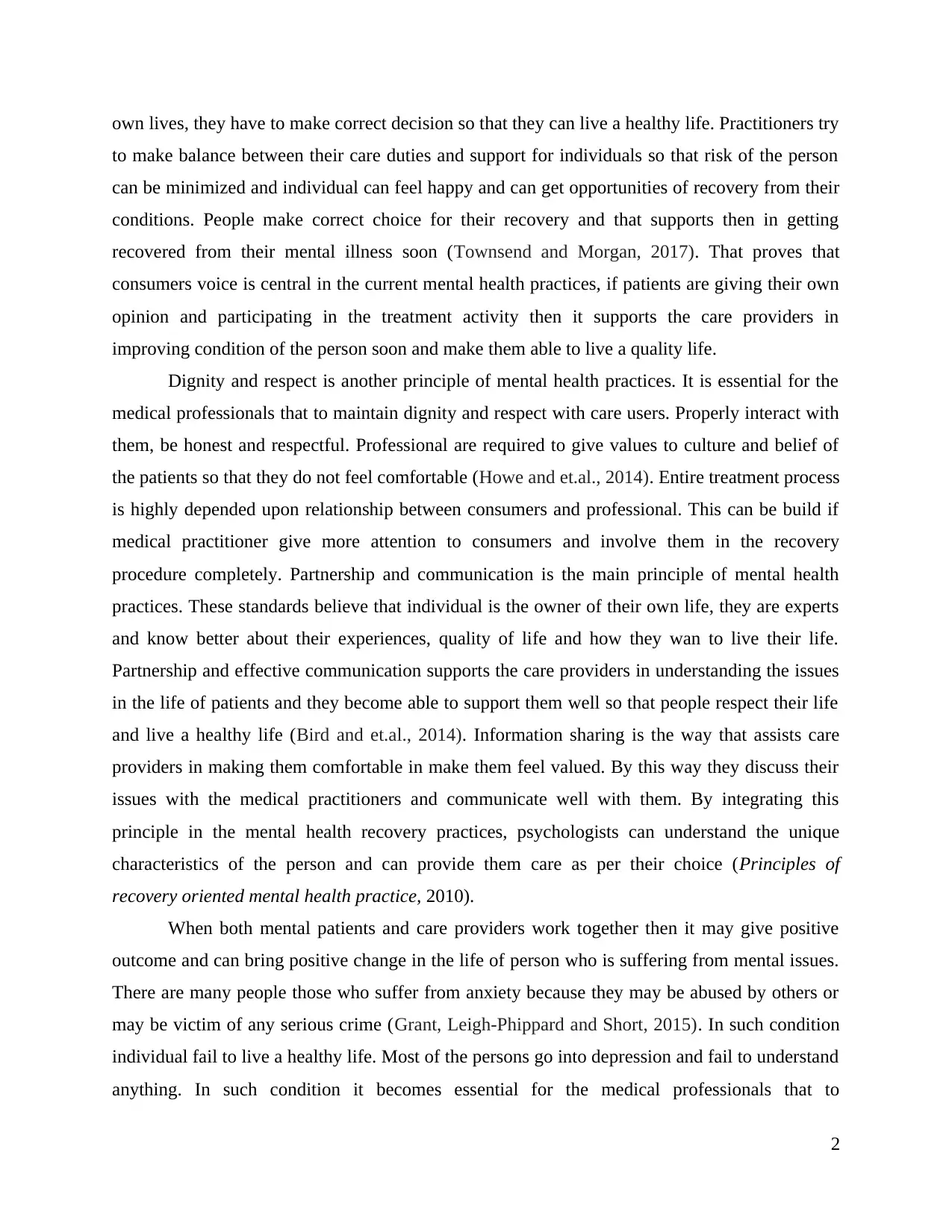
own lives, they have to make correct decision so that they can live a healthy life. Practitioners try
to make balance between their care duties and support for individuals so that risk of the person
can be minimized and individual can feel happy and can get opportunities of recovery from their
conditions. People make correct choice for their recovery and that supports then in getting
recovered from their mental illness soon (Townsend and Morgan, 2017). That proves that
consumers voice is central in the current mental health practices, if patients are giving their own
opinion and participating in the treatment activity then it supports the care providers in
improving condition of the person soon and make them able to live a quality life.
Dignity and respect is another principle of mental health practices. It is essential for the
medical professionals that to maintain dignity and respect with care users. Properly interact with
them, be honest and respectful. Professional are required to give values to culture and belief of
the patients so that they do not feel comfortable (Howe and et.al., 2014). Entire treatment process
is highly depended upon relationship between consumers and professional. This can be build if
medical practitioner give more attention to consumers and involve them in the recovery
procedure completely. Partnership and communication is the main principle of mental health
practices. These standards believe that individual is the owner of their own life, they are experts
and know better about their experiences, quality of life and how they wan to live their life.
Partnership and effective communication supports the care providers in understanding the issues
in the life of patients and they become able to support them well so that people respect their life
and live a healthy life (Bird and et.al., 2014). Information sharing is the way that assists care
providers in making them comfortable in make them feel valued. By this way they discuss their
issues with the medical practitioners and communicate well with them. By integrating this
principle in the mental health recovery practices, psychologists can understand the unique
characteristics of the person and can provide them care as per their choice (Principles of
recovery oriented mental health practice, 2010).
When both mental patients and care providers work together then it may give positive
outcome and can bring positive change in the life of person who is suffering from mental issues.
There are many people those who suffer from anxiety because they may be abused by others or
may be victim of any serious crime (Grant, Leigh‐Phippard and Short, 2015). In such condition
individual fail to live a healthy life. Most of the persons go into depression and fail to understand
anything. In such condition it becomes essential for the medical professionals that to
2
to make balance between their care duties and support for individuals so that risk of the person
can be minimized and individual can feel happy and can get opportunities of recovery from their
conditions. People make correct choice for their recovery and that supports then in getting
recovered from their mental illness soon (Townsend and Morgan, 2017). That proves that
consumers voice is central in the current mental health practices, if patients are giving their own
opinion and participating in the treatment activity then it supports the care providers in
improving condition of the person soon and make them able to live a quality life.
Dignity and respect is another principle of mental health practices. It is essential for the
medical professionals that to maintain dignity and respect with care users. Properly interact with
them, be honest and respectful. Professional are required to give values to culture and belief of
the patients so that they do not feel comfortable (Howe and et.al., 2014). Entire treatment process
is highly depended upon relationship between consumers and professional. This can be build if
medical practitioner give more attention to consumers and involve them in the recovery
procedure completely. Partnership and communication is the main principle of mental health
practices. These standards believe that individual is the owner of their own life, they are experts
and know better about their experiences, quality of life and how they wan to live their life.
Partnership and effective communication supports the care providers in understanding the issues
in the life of patients and they become able to support them well so that people respect their life
and live a healthy life (Bird and et.al., 2014). Information sharing is the way that assists care
providers in making them comfortable in make them feel valued. By this way they discuss their
issues with the medical practitioners and communicate well with them. By integrating this
principle in the mental health recovery practices, psychologists can understand the unique
characteristics of the person and can provide them care as per their choice (Principles of
recovery oriented mental health practice, 2010).
When both mental patients and care providers work together then it may give positive
outcome and can bring positive change in the life of person who is suffering from mental issues.
There are many people those who suffer from anxiety because they may be abused by others or
may be victim of any serious crime (Grant, Leigh‐Phippard and Short, 2015). In such condition
individual fail to live a healthy life. Most of the persons go into depression and fail to understand
anything. In such condition it becomes essential for the medical professionals that to
2
Paraphrase This Document
Need a fresh take? Get an instant paraphrase of this document with our AI Paraphraser
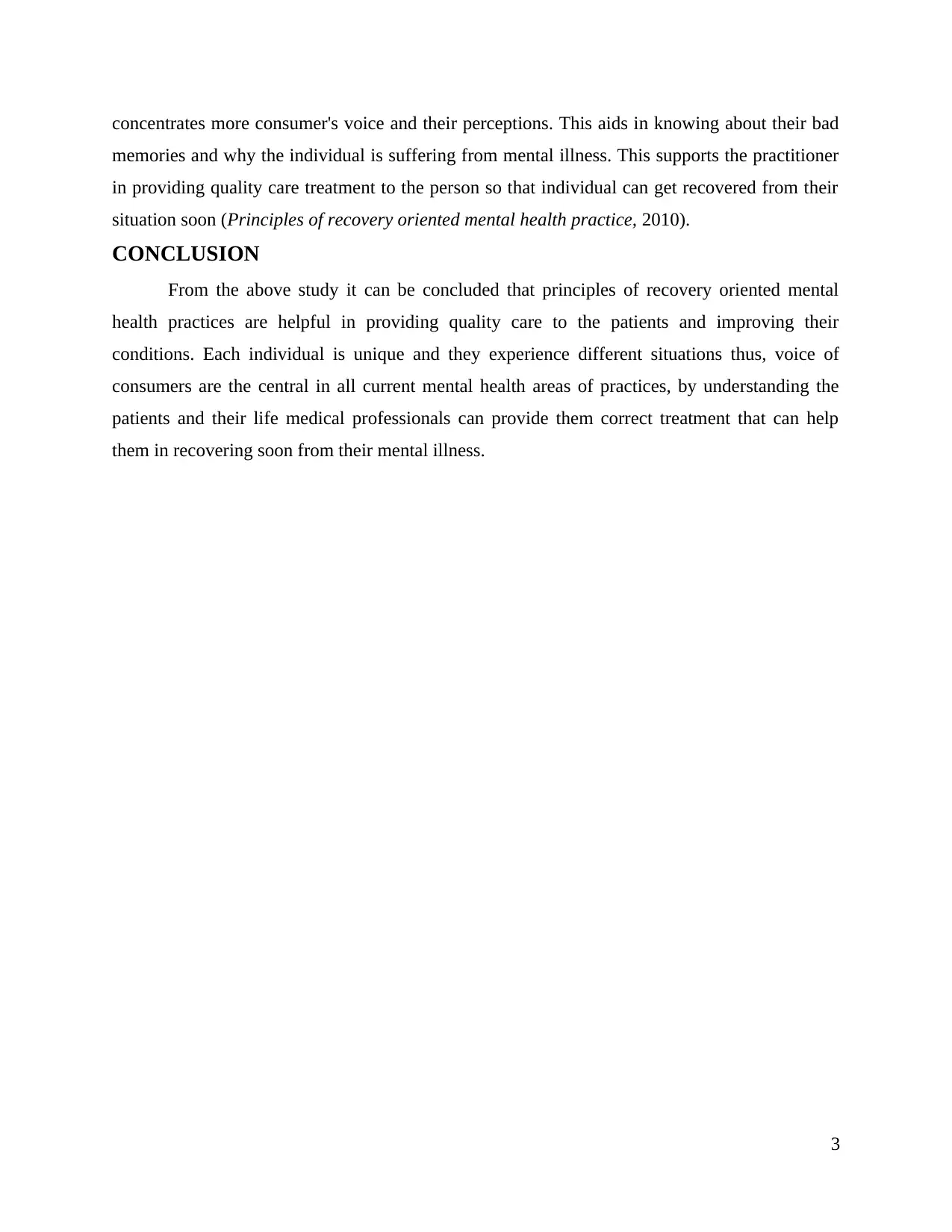
concentrates more consumer's voice and their perceptions. This aids in knowing about their bad
memories and why the individual is suffering from mental illness. This supports the practitioner
in providing quality care treatment to the person so that individual can get recovered from their
situation soon (Principles of recovery oriented mental health practice, 2010).
CONCLUSION
From the above study it can be concluded that principles of recovery oriented mental
health practices are helpful in providing quality care to the patients and improving their
conditions. Each individual is unique and they experience different situations thus, voice of
consumers are the central in all current mental health areas of practices, by understanding the
patients and their life medical professionals can provide them correct treatment that can help
them in recovering soon from their mental illness.
3
memories and why the individual is suffering from mental illness. This supports the practitioner
in providing quality care treatment to the person so that individual can get recovered from their
situation soon (Principles of recovery oriented mental health practice, 2010).
CONCLUSION
From the above study it can be concluded that principles of recovery oriented mental
health practices are helpful in providing quality care to the patients and improving their
conditions. Each individual is unique and they experience different situations thus, voice of
consumers are the central in all current mental health areas of practices, by understanding the
patients and their life medical professionals can provide them correct treatment that can help
them in recovering soon from their mental illness.
3
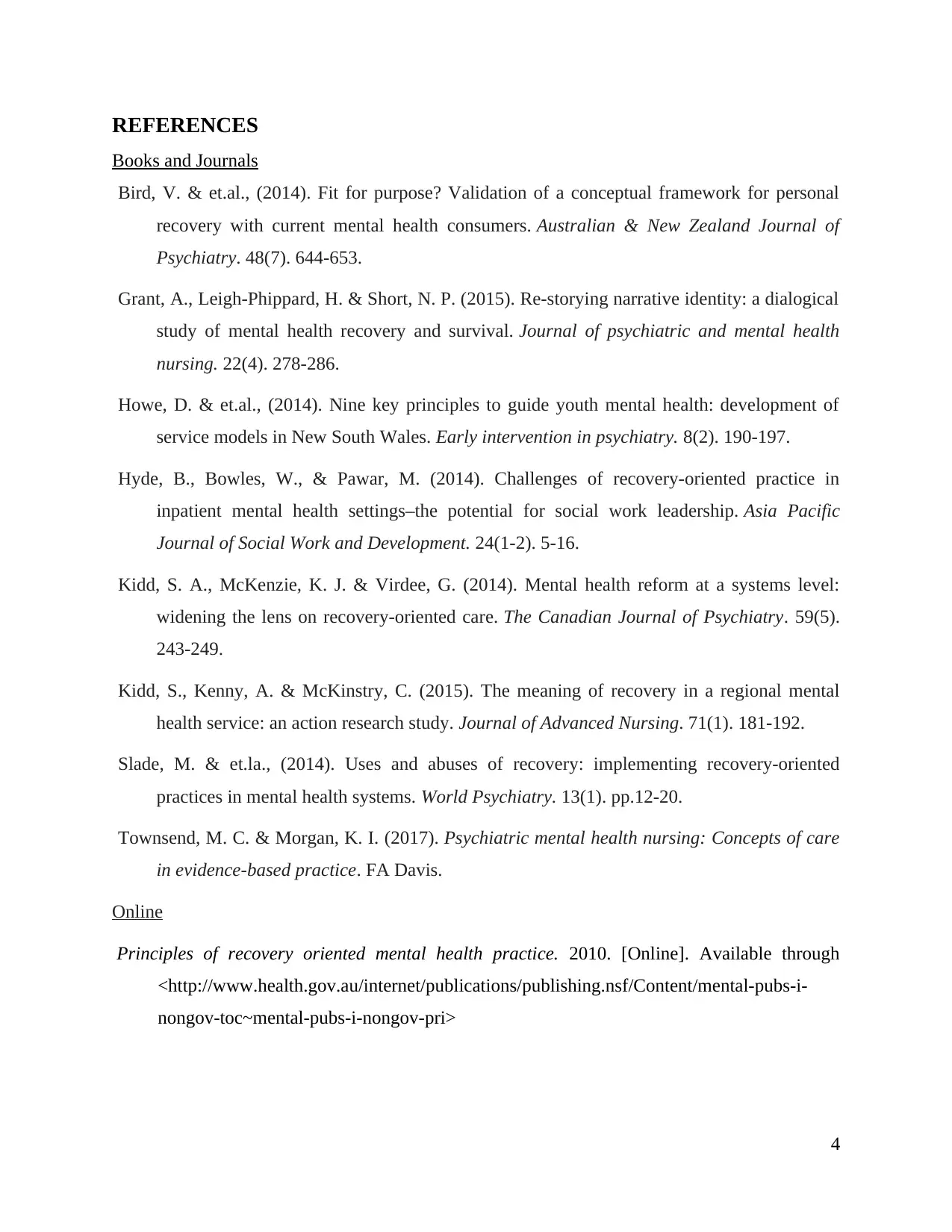
REFERENCES
Books and Journals
Bird, V. & et.al., (2014). Fit for purpose? Validation of a conceptual framework for personal
recovery with current mental health consumers. Australian & New Zealand Journal of
Psychiatry. 48(7). 644-653.
Grant, A., Leigh‐Phippard, H. & Short, N. P. (2015). Re‐storying narrative identity: a dialogical
study of mental health recovery and survival. Journal of psychiatric and mental health
nursing. 22(4). 278-286.
Howe, D. & et.al., (2014). Nine key principles to guide youth mental health: development of
service models in New South Wales. Early intervention in psychiatry. 8(2). 190-197.
Hyde, B., Bowles, W., & Pawar, M. (2014). Challenges of recovery-oriented practice in
inpatient mental health settings–the potential for social work leadership. Asia Pacific
Journal of Social Work and Development. 24(1-2). 5-16.
Kidd, S. A., McKenzie, K. J. & Virdee, G. (2014). Mental health reform at a systems level:
widening the lens on recovery-oriented care. The Canadian Journal of Psychiatry. 59(5).
243-249.
Kidd, S., Kenny, A. & McKinstry, C. (2015). The meaning of recovery in a regional mental
health service: an action research study. Journal of Advanced Nursing. 71(1). 181-192.
Slade, M. & et.la., (2014). Uses and abuses of recovery: implementing recovery‐oriented
practices in mental health systems. World Psychiatry. 13(1). pp.12-20.
Townsend, M. C. & Morgan, K. I. (2017). Psychiatric mental health nursing: Concepts of care
in evidence-based practice. FA Davis.
Online
Principles of recovery oriented mental health practice. 2010. [Online]. Available through
<http://www.health.gov.au/internet/publications/publishing.nsf/Content/mental-pubs-i-
nongov-toc~mental-pubs-i-nongov-pri>
4
Books and Journals
Bird, V. & et.al., (2014). Fit for purpose? Validation of a conceptual framework for personal
recovery with current mental health consumers. Australian & New Zealand Journal of
Psychiatry. 48(7). 644-653.
Grant, A., Leigh‐Phippard, H. & Short, N. P. (2015). Re‐storying narrative identity: a dialogical
study of mental health recovery and survival. Journal of psychiatric and mental health
nursing. 22(4). 278-286.
Howe, D. & et.al., (2014). Nine key principles to guide youth mental health: development of
service models in New South Wales. Early intervention in psychiatry. 8(2). 190-197.
Hyde, B., Bowles, W., & Pawar, M. (2014). Challenges of recovery-oriented practice in
inpatient mental health settings–the potential for social work leadership. Asia Pacific
Journal of Social Work and Development. 24(1-2). 5-16.
Kidd, S. A., McKenzie, K. J. & Virdee, G. (2014). Mental health reform at a systems level:
widening the lens on recovery-oriented care. The Canadian Journal of Psychiatry. 59(5).
243-249.
Kidd, S., Kenny, A. & McKinstry, C. (2015). The meaning of recovery in a regional mental
health service: an action research study. Journal of Advanced Nursing. 71(1). 181-192.
Slade, M. & et.la., (2014). Uses and abuses of recovery: implementing recovery‐oriented
practices in mental health systems. World Psychiatry. 13(1). pp.12-20.
Townsend, M. C. & Morgan, K. I. (2017). Psychiatric mental health nursing: Concepts of care
in evidence-based practice. FA Davis.
Online
Principles of recovery oriented mental health practice. 2010. [Online]. Available through
<http://www.health.gov.au/internet/publications/publishing.nsf/Content/mental-pubs-i-
nongov-toc~mental-pubs-i-nongov-pri>
4
⊘ This is a preview!⊘
Do you want full access?
Subscribe today to unlock all pages.

Trusted by 1+ million students worldwide
1 out of 6
Related Documents
Your All-in-One AI-Powered Toolkit for Academic Success.
+13062052269
info@desklib.com
Available 24*7 on WhatsApp / Email
![[object Object]](/_next/static/media/star-bottom.7253800d.svg)
Unlock your academic potential
Copyright © 2020–2026 A2Z Services. All Rights Reserved. Developed and managed by ZUCOL.





